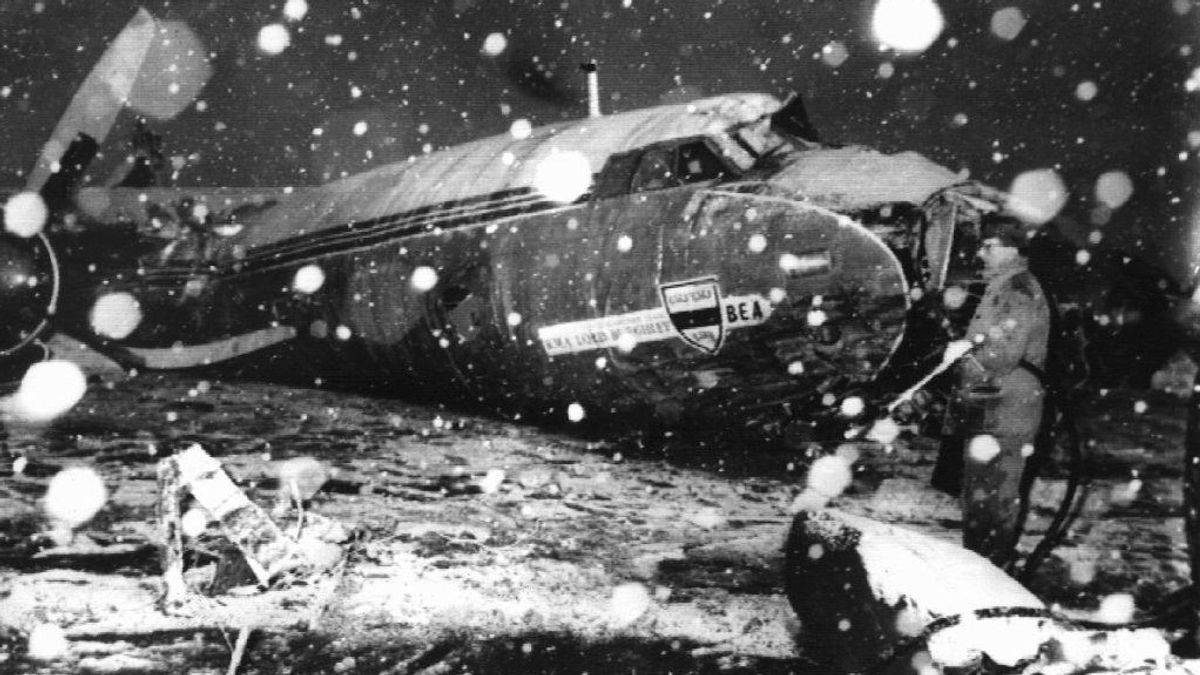JAKARTA - That day, February 6, 1958, at around 13:15 GMT + 1 time zone, British aircraft, Airspeed Ambassador 2 landed in Munich, Germany to refuel. The six-year-old plane took off later on fire and exploded, killing eight Manchester United players. The accident was known as the "Munich Disaster" or "Munich disaster."
After refueling, the Airspeed Ambassador 2 made two attempts to take off, although both attempts failed due to engine problems. After the second experiment, the snow was getting heavier. There is talk of delaying the flight to the next day.
However, the flight crew was eager to keep the schedule. The third take-off attempt was made. Unwittingly, the snow had accumulated on the runway, blanketing the plane's track and slowing it down.
The plane failed to reach enough speed to take off, then skidded over the end of the runway, crashed into the fence surrounding the airport and into a nearby building. Thick smoke began to blanket the plane. The flames consumed a building full of tires and fuel. An explosion ensued.
Grief of the Red Devils
The accident killed 23 people, including eight Manchester United players known as Busby Babes: Geoff Bent, Roger Byrne, Eddie Colman, Duncan Edwards, Mark Jones, David Pegg, Tommy Taylor and Liam "Billy" Whelan.
Great sorrow for the club nicknamed the Red Devils. Apart from players, Manchester United also lost three staff. They are the club secretary, Walter Crickmer; coach, Tom Curry; and head coach, Bert Whallev.

Not only for Manchester United, the Munich disaster also shook the world. Eight journalists on the flight also died: Alf Clarke, Donny Davies, George Follows, Tom Jackson, Archie Ledbrooke, Henry Rose, Frank Swift and Eric Thompson.
In addition, two crew members - Captain Kenneth Rayment and Tom Cable, as well as two other passengers on behalf of Bela Miklos and Willie Satinoff were also killed. Chronologically, 20 people died instantly in the incident, with three others dying in hospital, including one Manchester United player, Duncan Edwards who died after 15 days of treatment.
[/ read_more]
Harry Gregg's heroic action

On 17 February 2020, one of the survivors of the Munich Disaster, Harry Gregg, died at the age of 87. Gregg is remembered for his role in saving other passengers from the burning plane that day.
Harry Gregg is the club goalkeeper. He saved a number of people, including two teammates, Bobby Charlton and Dennis Viollet. Pilot James Thain also survived. However Captain Kenneth Rayment died of his wounds five weeks later.
Gregg's name is being hailed not only because of his role in saving Sir Bobby and Viollet out of the burning rubble of the building with their belts, but also for saving a 20-month-old baby and her mother who is pregnant and seriously injured. The woman is Vera Lukic, the wife of a Yugoslav diplomat.
Gregg twice returned to the burning plane to save as many people as possible. Gregg's courage even drew praise from the official authorities of Germany and Serbia, home to the rescued Lukic.
InvestigationThe initial investigation emphasized the blame on Thain. German airport authorities are seeking legal action against him. But Thain was released a decade later when further investigations revealed that the crash was caused by mud on the runway slowing down the plane.
It devastated the club, by missing a generation that was very promising, especially Edwards' colossal talent. Meanwhile, Busby recovered, assistant manager Jimmy Murphy led the interim club to the FA Cup final that season, although they ended up losing to Bolton Wanderers.
Busby almost quit football. But what's extraordinary about Munich is the way it has rebuilt the club. Within five years, his new team won the FA Cup, sparking United's glorious run in the 60s which included two league titles and the European Cup, which was lifted ten years after the Munich Disaster.
During the Muich Disaster, the team was in the middle of a European Cup competition. Manchester United at that time qualified for the semifinals after defeating Red Star Belgrade. The following day, troops, club staff, journalists and a number of other passengers boarded a British European Airways plane at Belgrade airport to fly back to Manchester.
[/ read_more]
The English, Chinese, Japanese, Arabic, and French versions are automatically generated by the AI. So there may still be inaccuracies in translating, please always see Indonesian as our main language. (system supported by DigitalSiber.id)









